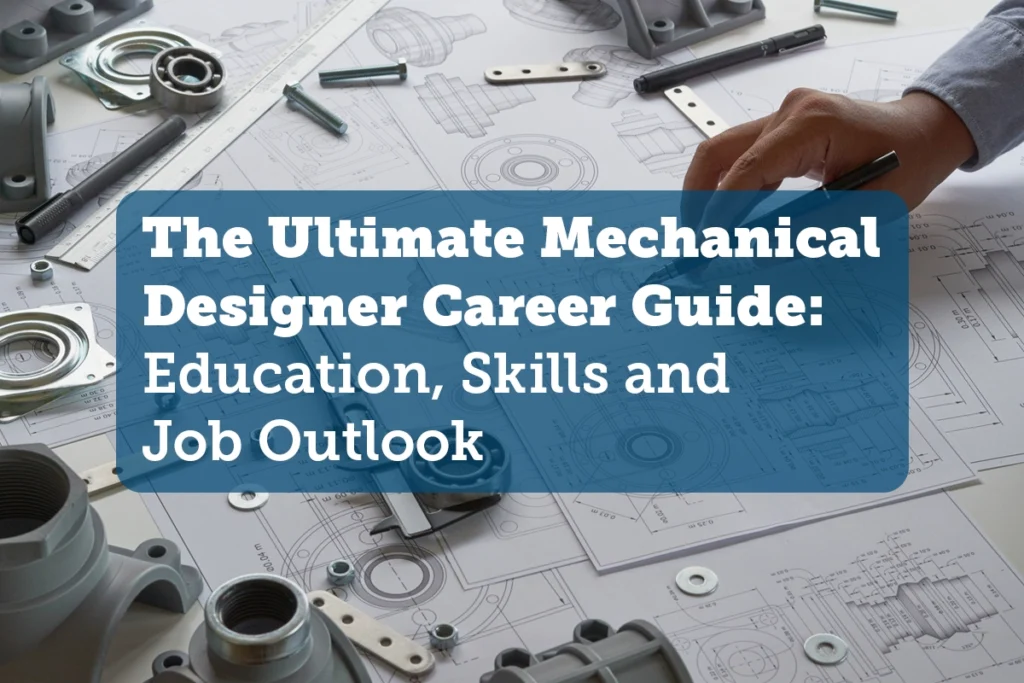Mechanical Designer Career Guide: Education, Skills, and Job Outlook
Are you interested in a career as a mechanical designer? In this career guide, we will explore the education, skills, and job outlook for mechanical designers. Whether you are just starting your educational journey or looking to enhance your existing skills, this article will provide you with valuable insights to help you thrive in this exciting field.

Understanding the Role of a Mechanical Designer
Before we dive into the education and skills required to become a mechanical designer, let’s first understand the role and responsibilities of this profession. Mechanical designers work very closely with mechanical engineers. Mechanical designers make technical drawings that reflect the plans and specifications of the engineers (Career Trend, 2018).
Imagine being a mechanical designer working on a project to design a cutting-edge aircraft engine. Your role would involve not only creating the overall design concept but also delving into the intricate details of the engine’s components. From the shape and size of the turbine blades to the placement of the fuel injection system, every aspect requires careful consideration and meticulous planning.
Key Responsibilities of a Mechanical Designer
As a mechanical designer, your main responsibilities will include:
Collaborating with engineers to develop design concepts and specifications
Creating detailed 3D models and drawings using computer-aided design (CAD) software
Performing calculations and simulations to ensure the functionality and efficiency of designs
Conducting research to stay up to date with the latest industry advancements and technologies
These responsibilities require a combination of technical expertise, creativity, and problem-solving skills. It’s not just about creating a design that looks good on paper; it’s about ensuring that the design is functional, efficient, and meets the specific requirements of the project.
Essential Traits for Success in Mechanical Design
While technical skills and knowledge are crucial for a successful career in mechanical design, certain traits can set you apart from the competition. Here are some essential traits for success:
Attention to Detail: Mechanical design involves working with intricate parts and complex systems. Attention to detail is essential to ensure accuracy and precision in your designs. From double-checking measurements to scrutinizing every component, your keen eye for detail will ensure that your designs are flawless.
Problem-Solving Skills: Mechanical designers often encounter challenges that require innovative solutions. Strong problem-solving skills will enable you to overcome obstacles and find creative ways to optimize designs. Whether it’s finding a workaround for a manufacturing constraint or improving the efficiency of a system, your ability to think freely will be invaluable.
Collaborative Nature: Mechanical design is a team-based profession. Effective collaboration with engineers, manufacturers, and other stakeholders is crucial for successful project outcomes. You’ll need to communicate your ideas clearly, listen to feedback, and work together to achieve the best possible results.
Continuous Learning: The field of mechanical design is constantly evolving. A passion for learning and staying updated with the latest advancements is essential to thrive in this dynamic industry. From attending conferences and workshops to exploring new software tools, your commitment to continuous learning will keep you at the forefront of innovation.
By embodying these traits, you’ll not only excel in your role as a mechanical designer but also contribute to the advancement of the industry as a whole. So, if you have a passion for problem-solving, attention to detail, and a thirst for knowledge, a career in mechanical design might just be the perfect fit for you.
Educational Pathways for Aspiring Mechanical Designers
Now that we have explored the role and key responsibilities of a mechanical designer, let’s discuss the educational pathways available for aspiring professionals.
Embarking on a journey to become a mechanical designer requires a solid educational foundation. While a bachelor’s degree in mechanical engineering or a related field is typically the minimum educational requirement, there are specialized degree programs that can provide a more focused and comprehensive education. These programs, such as Aerospace Engineering, Automotive Engineering, or Robotics Engineering, offer a deeper understanding of specific industries and technologies.
Imagine yourself studying Aerospace Engineering, examining the intricacies of designing aircraft and spacecraft. You would learn about aerodynamics, propulsion systems, and materials used in the aerospace industry. This specialized knowledge would give you an edge in pursuing a career in the aviation or space exploration sectors.
Alternatively, you may find yourself drawn to the world of Automotive Engineering, where you would immerse yourself in the design and development of automobiles. From learning about engine performance and vehicle dynamics to exploring the latest advancements in electric and autonomous vehicles, this specialized degree program would equip you with the skills needed to excel in the automotive industry.
Another fascinating pathway is Robotics Engineering, where you would dive into the realm of intelligent machines and automation. This field encompasses the design and programming of robots, as well as the integration of artificial intelligence and machine learning. With a degree in Robotics Engineering, you would be at the forefront of technological advancements, shaping the future of industries such as manufacturing, healthcare, and even space exploration.
While a bachelor’s degree is a great starting point, pursuing a master’s degree in mechanical engineering or a related field can open up advanced career opportunities. A master’s degree allows you to specialize in areas such as design optimization, computational fluid dynamics, or materials science.
Imagine yourself pursuing a master’s degree in design optimization, where you would explore innovative techniques to enhance the performance and efficiency of mechanical systems. You would dive into the world of computer-aided design and simulation, using advanced algorithms to optimize designs and minimize costs.
Alternatively, you may be captivated by the field of computational fluid dynamics, where you would study the behavior of fluids and their interaction with mechanical systems. This specialization would enable you to simulate and analyze fluid flow, heat transfer, and aerodynamics, playing a crucial role in the design of aircraft, automobiles, and even renewable energy systems.
Materials science is yet another exciting area of specialization, where you would observe the properties and behavior of different materials. From understanding the strength and durability of metals to exploring the versatility of composites and polymers, this field is essential for designing innovative and sustainable products.
Importance of Accreditation in Mechanical Design Education
When choosing a degree program, it is essential to ensure that the institution is accredited by a recognized accrediting body. Accreditation ensures that the program meets certain quality standards and prepares you for a successful career in mechanical design.
Accredited programs often have rigorous curriculum requirements, industry connections, and access to state-of-the-art facilities and equipment. Imagine yourself studying in a program that offers hands-on experience with cutting-edge design software, advanced laboratories, and industry partnerships that provide valuable internships and job opportunities.
Furthermore, employers highly value degrees from accredited institutions, as they indicate a higher level of competence and professionalism. Accreditation serves as a mark of quality, assuring potential employers that you have received a comprehensive education and possess the necessary skills to excel in the field of mechanical design.
Skills Required for a Career in Mechanical Design
Beyond formal education, acquiring the necessary skills is critical for a successful career in mechanical design. Let’s explore the technical and soft skills that employers value in this field.
Technical Skills for Mechanical Designers
Proficiency in computer-aided design (CAD) software is essential for mechanical designers. CAD software allows you to create accurate 2D and 3D models, perform simulations, and generate detailed drawings. Some widely used CAD software in the industry include AutoCAD, SolidWorks, and CATIA.
Additionally, a strong understanding of engineering principles, materials science, and manufacturing processes is essential for developing functional and cost-effective designs.
Soft Skills for Effective Mechanical Design
While technical skills are fundamental, soft skills play a crucial role in the effectiveness of mechanical designers. Here are some essential soft skills:
Communication: Effective oral and written communication skills are essential for conveying ideas, collaborating with team members, and presenting designs to clients.
Time Management: Mechanical designers often work on multiple projects simultaneously. Efficient time management skills will help you meet deadlines and deliver high-quality work.
Attention to Client Needs: Understanding the needs and requirements of clients is crucial for designing solutions that meet their expectations. Active listening and empathy are key skills in this aspect.
Adaptability: Mechanical design projects can be dynamic and subject to changes. Being adaptable and open to new ideas will enable you to navigate these challenges with ease.
Certifications and Licenses for Mechanical Designers
In addition to your educational background and skills, obtaining certifications can further enhance your credentials as a mechanical designer.
Overview of Relevant Certifications
The American Society of Mechanical Engineers (ASME) offers several certifications that can validate your skills and knowledge in mechanical design. These certifications include Certified SolidWorks Professional (CSWP), Certified SolidWorks Expert (CSWE), and Certified CAD Designer (CCD).
Other industry-specific certifications, such as the Aerospace Certified Engineer (ACE) or the Automotive Certified Engineer (ACE), can provide you with specialized knowledge and make you more competitive in these sectors.
The Process of Licensing for Mechanical Designers
While obtaining a license is not always mandatory for mechanical designers, it can enhance your professional standing and expand your career prospects. Licensing requirements vary by state and may include passing an examination and possessing a certain level of experience.
The National Council of Examiners for Engineering and Surveying (NCEES) provides the Fundamentals of Engineering (FE) exam, which serves as the first step in the licensing process. After gaining relevant work experience, you can take the Principles and Practice of Engineering (PE) exam to become a licensed professional engineer (PE).
Job Outlook for Mechanical Designers
Now that you have a solid understanding of the education, skills, and certifications required for a career in mechanical design, let’s explore the job outlook in this field.
Current Job Market Trends
The demand for mechanical designers is expected to grow in the coming years, driven by advancements in technology and increased emphasis on sustainable design practices. According to the U.S. Bureau of Labor Statistics, the employment of mechanical engineers, including mechanical designers, is projected to grow 4% from 2019 to 2029, which is about as fast as the average for all occupations.
Industries such as automotive, aerospace, and renewable energy are expected to offer excellent job prospects for mechanical designers. Emerging fields like additive manufacturing (3D printing) and robotics are also creating exciting opportunities for professionals with expertise in these areas.
Future Predictions for the Mechanical Design Field
As technology continues to advance, the role of mechanical designers will evolve with it. The integration of artificial intelligence (AI), machine learning, and automation in design processes will change the way mechanical designers work, allowing for more efficient designs and faster product development cycles.
Furthermore, the increasing focus on sustainability and renewable energy will drive the need for mechanical designers who can develop environmentally friendly solutions and optimize energy consumption in mechanical systems.
A career in mechanical design offers an exciting and promising future for individuals with a passion for innovation and problem-solving. By pursuing the right education, acquiring the necessary skills, and staying abreast of industry trends, you can position yourself for success in this dynamic field
Launch Your Mechanical Design Career with Hunter Recruiting
Ready to turn your passion for mechanical design into a rewarding career? Hunter Recruiting is here to connect you with top-tier opportunities in the field. Our dedicated technical recruitment team is committed to matching your expertise with innovative employers seeking the brightest minds in science, technology, engineering, and more. Don’t wait to make your mark in engineering – Find your next job with a trusted staffing agency that serves Fortune 500 companies and healthcare leaders. Your future in mechanical design starts now!






